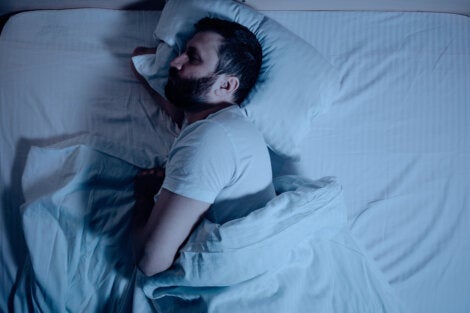Deep Sleep Therapy: What Is It? Why Isn't It Used Anymore?

Deep sleep therapy actually dates back a long time. However, it became a mental disorder treatment approximately at the beginning of the twentieth century, mainly in Russia. This therapy had very encouraging results for schizophrenia, depression, anxiety, addictions, and other disorders.
These days, deep sleep therapy isn’t part of conventional treatments. However, it hasn’t disappeared entirely either. Some patients benefit from it and some psychiatrists still resort to it in special cases.
Deep sleep therapy can be very effective in the treatment of various mental disorders. However, the Chelmsford Private Hospital in Australia reported the death of 24 patients between 1963 and 1979 due to this treatment. This led to a general rejection of deep sleep therapy as a treatment option.
“A good laugh and a long sleep are the two best cures for anything.”
-Irish proverb-

What’s deep sleep therapy?
One of the first signs of a mental disorder is difficulty sleeping. Along the same lines, one of the best ways to recover mental stability is through deep and restoring sleep. This benefit of sleep has been known since the origins of psychiatry and psychology. It was also the reason behind the development of deep sleep therapy.
This therapy consists of a psychiatrist inducing unconsciousness in a patient who suffers from a mental disorder. It’s an intensive psychiatry therapy because the person generally has to sleep for five to nine days straight.
The person stays asleep during this time because they take different sleeping pills. The patient only wakes up for short periods to eat and go to the bathroom. As far as we know, the first doctor to use this technique was Scotsman Neil Macleod in 1900.
However, Jakov Klasi was the physician who instituted it as a treatment at the Psychiatric University Hospital of Zurich. He called it prolonged sleep treatment or prolonged narcosis. However, today, it’s known as deep sleep therapy.
The benefits
After Klasi popularized it, deep sleep therapy gained prestige and psychiatrists started to use it throughout the world. It proved to be especially effective in helping to stabilize extremely agitated patients. Psychiatrists found that sedation and prolonged sleep could help mentally stabilize patients.
Some mental conditions cause extra high levels of dopamine, adrenaline, and noradrenaline. However, deep sleep helps return the brain to normal and stable conditions. It’s like resetting the brain.
People who are in an extremely nervous and agitated state are very vulnerable to any change or disturbance in their environment. When they’re asleep, however, these external factors can’t disrupt them. Deep sleep also puts their conscience and thoughts on hold, which means their brain can calm down and return to normal.

Side effects and risks of deep sleep therapy
Right from the start, therapists reported various side effects to this treatment. Klasi himself reported the death of three of 26 patients that he treated with it. Also, different psychiatrists noted other problems. Some of these effects were an increase in body temperature, urinary retention, difficulty swallowing, and speech and gait disorders.
Several times, the psychiatrists tried changing the medications they administered, and everything seemed to go better. However, the treatment also requires the patient’s continuous supervision and constant monitoring. Watching over the patient is extremely demanding and requires a lot of resources. For that reason, when antipsychotic drugs were invented, deep sleep therapy was gradually pushed to the back burner.
The last nail in the coffin, however, came after a report from the Chelmsford Private Hospital in Australia was published. This report stated that deep sleep therapy had been used on 1,115 patients over 15 years. During that period, 24 of them died. The following year, authorities banned the treatment in both Australia and New Zealand.
Despite the above, some psychiatrists still use this treatment for specialized cases in different parts of the world. Many of the reported deaths were later found to be associated with medical problems unrelated to the therapy itself.
If you think deep sleep therapy could benefit you, you’ll need to go to a specialized center run by qualified professionals.
Deep sleep therapy actually dates back a long time. However, it became a mental disorder treatment approximately at the beginning of the twentieth century, mainly in Russia. This therapy had very encouraging results for schizophrenia, depression, anxiety, addictions, and other disorders.
These days, deep sleep therapy isn’t part of conventional treatments. However, it hasn’t disappeared entirely either. Some patients benefit from it and some psychiatrists still resort to it in special cases.
Deep sleep therapy can be very effective in the treatment of various mental disorders. However, the Chelmsford Private Hospital in Australia reported the death of 24 patients between 1963 and 1979 due to this treatment. This led to a general rejection of deep sleep therapy as a treatment option.
“A good laugh and a long sleep are the two best cures for anything.”
-Irish proverb-

What’s deep sleep therapy?
One of the first signs of a mental disorder is difficulty sleeping. Along the same lines, one of the best ways to recover mental stability is through deep and restoring sleep. This benefit of sleep has been known since the origins of psychiatry and psychology. It was also the reason behind the development of deep sleep therapy.
This therapy consists of a psychiatrist inducing unconsciousness in a patient who suffers from a mental disorder. It’s an intensive psychiatry therapy because the person generally has to sleep for five to nine days straight.
The person stays asleep during this time because they take different sleeping pills. The patient only wakes up for short periods to eat and go to the bathroom. As far as we know, the first doctor to use this technique was Scotsman Neil Macleod in 1900.
However, Jakov Klasi was the physician who instituted it as a treatment at the Psychiatric University Hospital of Zurich. He called it prolonged sleep treatment or prolonged narcosis. However, today, it’s known as deep sleep therapy.
The benefits
After Klasi popularized it, deep sleep therapy gained prestige and psychiatrists started to use it throughout the world. It proved to be especially effective in helping to stabilize extremely agitated patients. Psychiatrists found that sedation and prolonged sleep could help mentally stabilize patients.
Some mental conditions cause extra high levels of dopamine, adrenaline, and noradrenaline. However, deep sleep helps return the brain to normal and stable conditions. It’s like resetting the brain.
People who are in an extremely nervous and agitated state are very vulnerable to any change or disturbance in their environment. When they’re asleep, however, these external factors can’t disrupt them. Deep sleep also puts their conscience and thoughts on hold, which means their brain can calm down and return to normal.

Side effects and risks of deep sleep therapy
Right from the start, therapists reported various side effects to this treatment. Klasi himself reported the death of three of 26 patients that he treated with it. Also, different psychiatrists noted other problems. Some of these effects were an increase in body temperature, urinary retention, difficulty swallowing, and speech and gait disorders.
Several times, the psychiatrists tried changing the medications they administered, and everything seemed to go better. However, the treatment also requires the patient’s continuous supervision and constant monitoring. Watching over the patient is extremely demanding and requires a lot of resources. For that reason, when antipsychotic drugs were invented, deep sleep therapy was gradually pushed to the back burner.
The last nail in the coffin, however, came after a report from the Chelmsford Private Hospital in Australia was published. This report stated that deep sleep therapy had been used on 1,115 patients over 15 years. During that period, 24 of them died. The following year, authorities banned the treatment in both Australia and New Zealand.
Despite the above, some psychiatrists still use this treatment for specialized cases in different parts of the world. Many of the reported deaths were later found to be associated with medical problems unrelated to the therapy itself.
If you think deep sleep therapy could benefit you, you’ll need to go to a specialized center run by qualified professionals.
All cited sources were thoroughly reviewed by our team to ensure their quality, reliability, currency, and validity. The bibliography of this article was considered reliable and of academic or scientific accuracy.
Stucchi-Portocarrero, S., & Cortez-Vergara, C. (2020). La cura de sueño en la historia. Revista de Neuro-Psiquiatría, 83(1), 40-44.
This text is provided for informational purposes only and does not replace consultation with a professional. If in doubt, consult your specialist.







